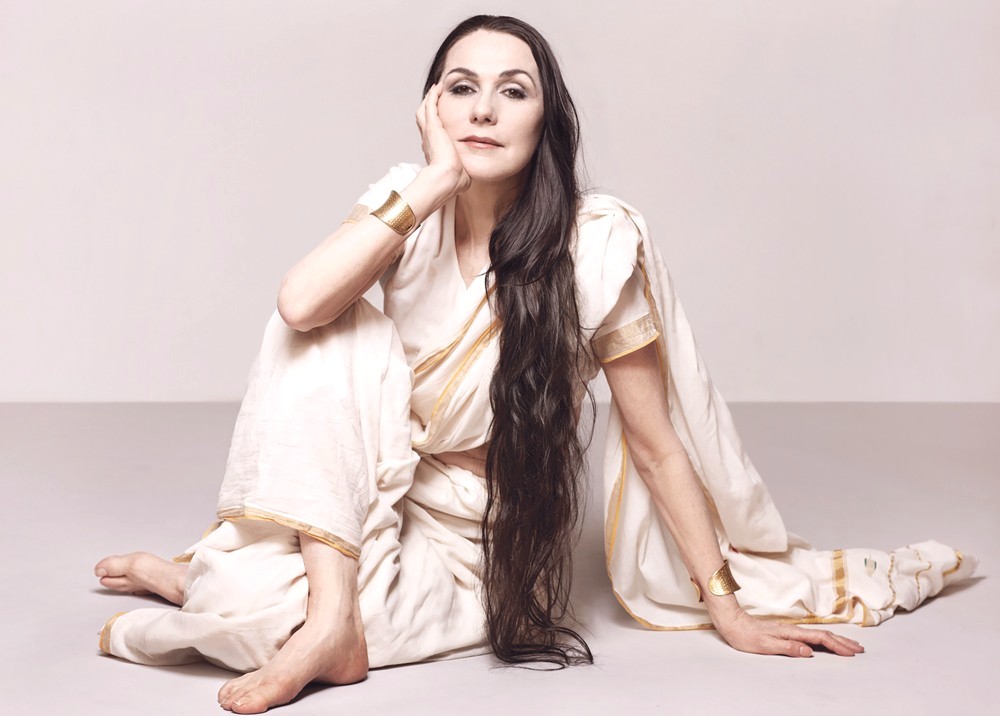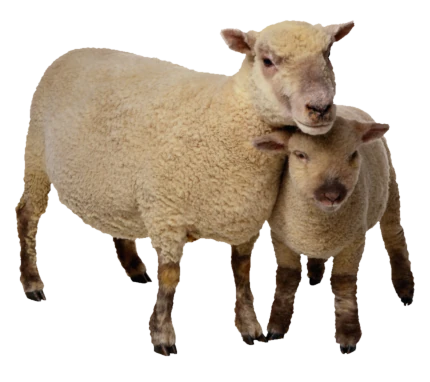The most evolved diet for a peaceful, balanced Earth? For Sharon Gannon, the hands-down answer is veganism.
By Wendy Kagan
Yoga luminary Sharon Gannon may mince a lot of vegetables, but she doesn’t mince words when she talks about vegan diets. Since well before she and her partner David Life created the Jivamukti Yoga method in 1984, Gannon has been standing up for animal rights and espousing the virtues of a vegan diet in clear, forthright words.
These days, she has more of an audience than ever for that message, as plant-based (aka vegan) diets are moving from fringe to fashionable at a steady clip.
In the ’70s, yoga was that weird thing from India that Western hippies did, and now it’s everywhere. Veganism isn’t so far behind. Whether you chalk it up to the realities of our disease-causing and pandemic-spawning standard American diet (SAD), or to a deepening understanding of the fragility of our environment, the vegan wave is gathering strength.
In her new book Yoga & Veganism: The Diet of Enlightenment (2020), Gannon updates and adds (faux) meat to her 2008 manifesto Yoga & Vegetarianism, bolstering the argument that a vegan diet is the true path to yogic bliss.
Both versions draw inspiration from the Yoga Sutras of Patanjali—the philosophical text from about 2,200 years ago that offers a practical blueprint toward self-realization—though the new book expands to include some of our current mindset shifts, as well as a few recipes from Gannon’s home kitchen in the Lake Hill hamlet of Woodstock. I connected recently with Gannon—a self-professed “spiritual activist,” musician, poet, and animal lover—to talk about the evolution of veganism, which just might be inspiring an evolution of human consciousness.
Plant-based diets are having a moment. Why do you think the culture is waking up to them?
Sharon Gannon: Most people adopt a plant-based diet for health reasons. Recently, there has been a lot of media coverage focused on scientific, medical evidence from doctors supporting a plant-based diet to improve health and even cure diseases like heart disease, diabetes, and cancer. Many younger people are becoming vegan because they are concerned for the environment—the world they and their children will have to live in. The facts linking meat and dairy to global warming and the overall destruction of the planet are undeniable. When a young spokesperson like Greta Thunberg bravely and eloquently speaks out about veganism and the environment, she is heard by many young people.
The general public tends to follow trends set by celebrities—and Ingrid Newkirk and PETA [People for the Ethical Treatment of Animals] have provided a platform for celebrities to speak about the importance of veganism and its impact on health, the environment, and animals.
In the music world, multi-Grammy winner Billie Eilish is outspoken about her veganism, as is Paul McCartney, Beyoncé, and Moby. In his Academy Award acceptance speech last year, Joaquin Phoenix used his celebrity moment to direct the spotlight on the horrific plight of dairy cows, asking us all to consider veganism. And filmmaker James Cameron recently produced The Game Changers, a documentary focusing on champion athletes who are vegan, to dispel myths propagated by the meat and dairy industries that tell us we need to eat animals to get enough protein, calcium, [and other nutrients].
You changed your book title from Yoga & Vegetarianism (2008) to Yoga & Veganism (2020). Why?
Over time, certain words tend to lose their meaning. Vegetarianism is one such word. Originally, it meant eating vegetables. But it had been co-opted to mean eating vegetables and milk products and eggs and fish and chicken and white meat. It became acceptable to say you were a vegetarian if you just took beef out of your diet or even limited it to once a week! So, a new word was created to mean vegetarianism and that word is vegan—for now. Who knows, it might become corrupted as well and a newer word will have to be invented.
We live in a culture where the art of speaking and expanding one’s vocabulary are not skills to be encouraged. Telling the truth is not highly regarded either. Lies are an acceptable form of communication—look at the advertising industry. It is common not to say what you mean or to mean what you say.
Like it or not, yoga and veganism are often tied to socioeconomic and racial privilege in America. How can the movement be more inclusive?
Cheap food now equals expensive medical bills later. Most people tend to eat what they are used to eating. They don’t think much further than a preference to satisfy an appetite and what’s cheap. They aren’t making conscious food choices.
Eating meat is not hardwired in us—it is a learned behavior that has become a psychological habit and a biological addiction. It has been promoted as a status symbol, a sign of success. Americans, like most human beings in the world, have been eating animals for thousands of years. It is wrapped up with our cultural identity. To have a “chicken in the pot on Sunday” was touted as a sign of success for poor people. America was and still represents for many the “Land of the Free,” where a person can achieve success and be free to do what they want, which usually means having the money to buy what you want.
Freedom has also come to be associated with power; to be in a position of power means controlling others. A successful person is respected as well as feared because of their ability to exercise power over others. Many people crave power, money, and material things and see these as the ultimate goals of life.
The hierarchal model is very much a part of most people’s perception of life. And because of that, most want to be on top because there’s the promise of having a lot of power over others. We are taught to practice how to climb up the ladder to the top from an early age, no matter what our socioeconomic or racial situation may be. We are taught that self-confidence and self-esteem are acquired for competing against and dominating others. We are not taught humility, empathy, or compassion. These are signs of weakness and may be exhibited in small doses but only in a charitable way, when you can still maintain your sense of superiority over the poor and suffering.
Our global culture and its economy are rooted in the enslavement, exploitation, and commodification of animals. In other words, exercising power over the defenseless. Animals are at the lowest rung on the ladder. The mission statement of our culture can be summed up as “The Earth Belongs to Us.” This underlying sense of privilege is present everywhere, regardless of race or socioeconomic status. It is this false sense of superiority that has corrupted the soul of humanity and has fostered a society of fear.
If we are to survive as a species on this planet, we must learn how to live in harmony with the Earth and all other beings, human as well as animal—all of life. And that means discovering ways to live alongside others that are mutually beneficial.
Eating meat is a learned behavior, and what is learned can be unlearned. The solution lies in education, but that education must come from unbiased sources—not from advertisers hired by the animal-user industries to promote their products. I believe that veganism is an important first step in this evolution.
How can plant-based diets help us prevent the next pandemic?
What we do to others, we eventually, but inevitably, do to ourselves. We are experiencing a global pandemic that has resulted in restricting our mobility. Many people are in lockdown—quarantined. But our lockdown is light compared to what billions of animals experience every day, being locked-down, tethered, and confined into small cages, awaiting their death.
This is not the first pandemic and will not be the last. The coronavirus is a zoonotic disease, meaning the virus jumped from animals to humans. The stress of confinement suffered by trapped and enslaved animals is known to bring about pathologies. We know this from past pandemics. Mutations allow diseases to jump species: trichinosis, tuberculosis, and swine flu were originally diseases found in pigs; influenza came from avian (bird) flu; horsepox mutated into smallpox; bovine rinderpest became measles; and Creutzfeldt-Jakobs disease is the human equivalent of mad cow disease. The 2003 SARS pandemic, like today’s [SARS-CoV-2, the virus that causes COVID-19], is thought to have been transmitted by bats. Many scientists think that HIV [the virus that causes AIDS] spread to humans through bushmeat. The 2014 Ebola outbreak originating in Africa was believed to be caused by eating bushmeat. Bushmeat refers to many species of wild animals including bats, antelopes, monkeys, snakes, and rats.
We may have a vaccination that will protect us from the current COVID-19 pandemic, but it is only a matter of time before the next pandemic will appear. We can prevent future pandemics by rooting out the cause of the present one. When we start to see how interrelated we are with others and the world around us, we will stop making animals sick and we will stop enslaving, confining, torturing, and abusing them. We will stop seeing their bodies as commodities to be bought and sold. When we start to see other animals as the people they are, worthy of our respect and consideration, then we will discover respect for ourselves.
The reasons that many of us have for going vegan are heavy: violence toward animals, global warming, deforestation. How can eating vegan let us live with a lighter heart?
There is so much violence and suffering in the world today, but by going vegan you know in your heart that you are not contributing to it. Eating vegan is the kinder choice. The yogic teachings say that joy is our true nature and that kindness is the key to the heart. Consciously choosing not to cause pain in others will instigate an awakening of joy in our hearts. A vegan diet is a simple recipe for joy.
What has quarantine been like for you?
For the past five years or so, I have been moving towards living a more hermetic lifestyle, focused on writing, music, and spiritual practices, so the quarantine hasn’t affected me much. I am grateful to have a break from traveling. This past year I have published two books—Yoga & Veganism and Magic Is a Shift in Perception, Poems 1972–2019, a memoir of sorts—and recorded audiobook versions of both.
How can we best nourish ourselves during this uncertain time?
All times are uncertain. Life is uncertain. No matter what we may tell ourselves, we are not in control and do not know what the future holds. The best nourishment is to nourish our souls, resist the temptation to blame and complain, and replace it with a focus on remembering God and exploring new ways to be kind and uplifting to others.
Source: Chronogram

